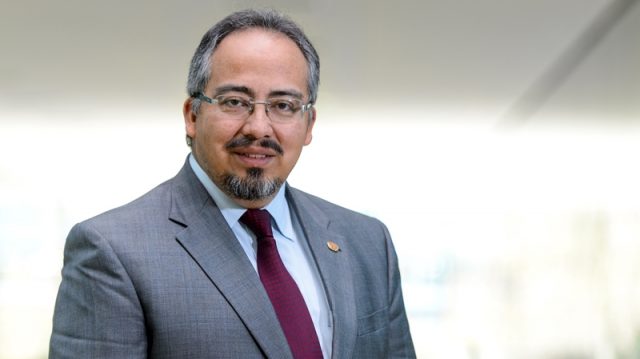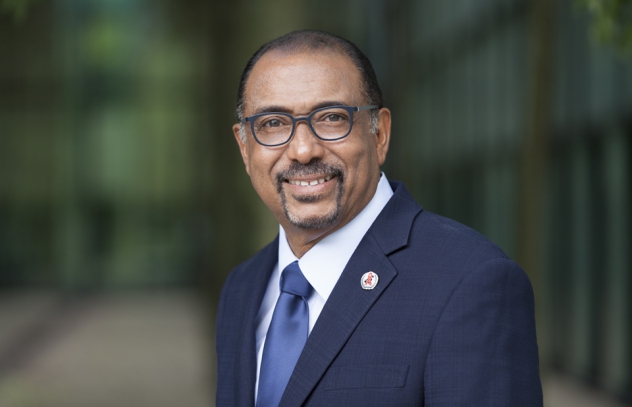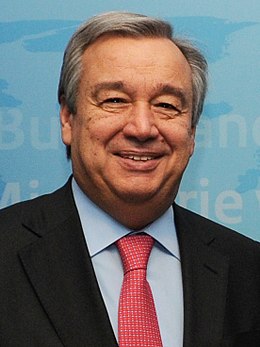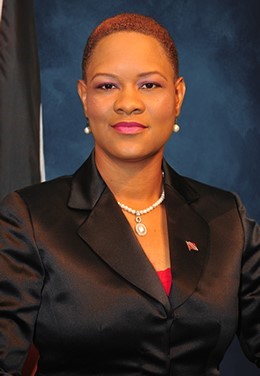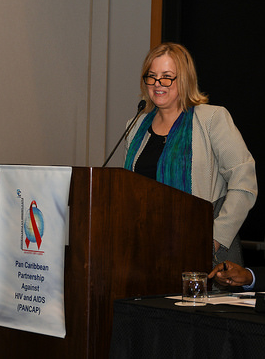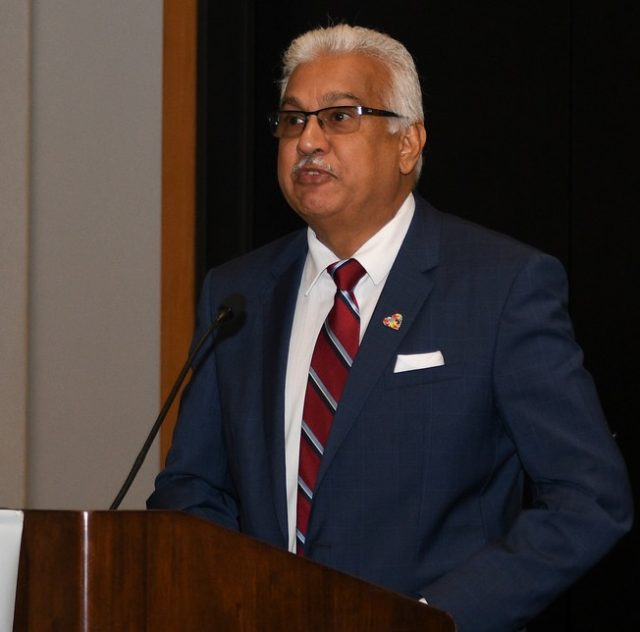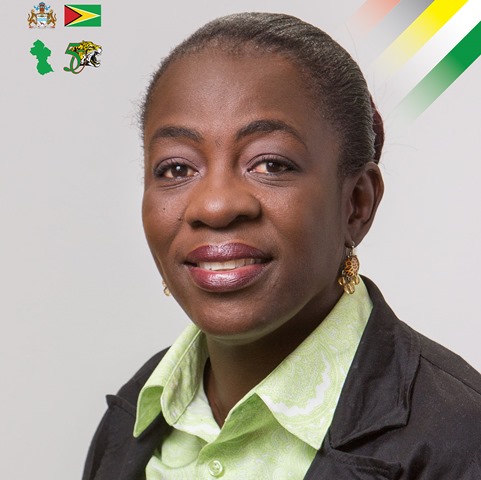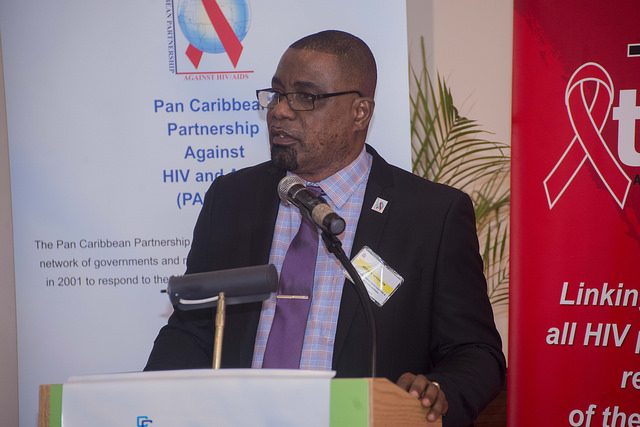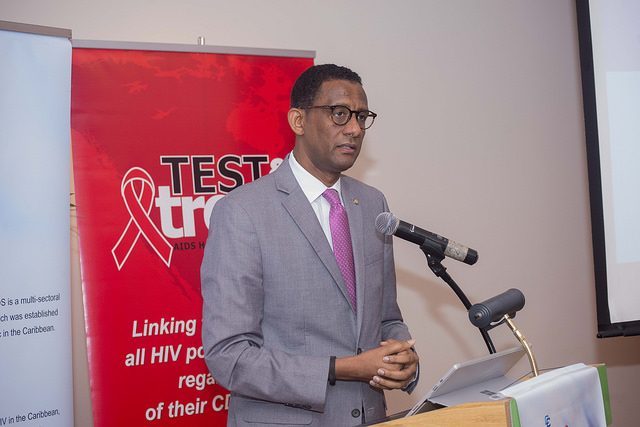Good Morning,
It is a pleasure and an honour to have been invited to officially open this Pan Caribbean Partnership Against HIV and AIDS (PANCAP) led sub-regional meeting on the National Action towards the Elimination of STIs and Viral Hepatitis in the Caribbean.
The data utilised in this feature address was acquired as a collaborative effort between the Ministry of Health and the National AIDS Coordinating Committee.
As Minister of State in the Office of the Prime Minister, with responsibility for the National AIDS Coordinating Committee, I am well aware of the significance of today’s meeting.
I would like to start by thanking the Pan American Health Organization, the World Health Organisation, PANCAP and all our Technical partners for their invaluable contributions to our regional response to HIV and STIs and the support to our pioneering spirit.
The Pan American Health Organization’s EMTCT Plus framework for elimination of mother-to-child transmission of HIV, Syphilis, Hepatitis B, and Chagas highlights the point that, “one of the greatest public health success stories, globally and in particular in the Americas, has been the development and implementation of interventions to prevent mother-to-child transmission of HIV [3].
Ladies and Gentlemen, in 2015, an estimated 670,000 women aged 15 and over in Latin America and the Caribbean were living with HIV, of whom an estimated 58% were receiving antiretroviral therapy (ART) (2015 data) [4]. Medication coverage in pregnant women rose from 55% in 2010 to 88% in 2015, and the estimated mother-to-child transmission rate decreased from 15% to 8% over the same period.
New HIV infections in children (0-14 years old) declined by 55% between 2010 and 2015 (from 4,700 [Confidence interval 3,500-6,400] to 2,100 [Confidence interval 1,600-2,900]), and an estimated 28,000 new HIV infections were averted in the same period.
In Trinidad and Tobago by the end of 2016, there was an estimated 3,800 women aged 15 and over living with HIV. Of that number an estimated 92% were receiving ART [5]. Antiretroviral medicine coverage in pregnant women reached 95% in 2016 [6], this represented a significant increase from 81% in 2010 [7]. Our estimated Mother to Child Transmission rate decreased from 16.3 in 2010 [7] to 3.38 in 2016 [6].
Ladies and gentlemen, the global data indicates that HIV shares a commonality with STIs and Viral Hepatitis given that these diseases are spread through pathways linked to sexual and reproductive health and changing societal behaviours.
In Trinidad and Tobago our 2016 data reveal that of the 13,482 pregnant women attending antenatal clinics, only 0.2 had a positive (reactive) syphilis serology [6]. Although our positivity rate for syphilis in pregnant women appears to be low, our surveillance of congenital syphilis needs to be strengthened.
The general positivity rate for Hepatitis B, decreased from 7.9% to 4.5% from January 2012 to June 2015 [8]. Data from one treatment and care site indicates that 3.7% of persons starting HIV antiretroviral therapy during 2017 had a co-infection with Hepatitis B [9]. Testing for Hepatitis C is expected to commence shortly.
Ladies and gentlemen, Great things come from the Caribbean. Leadership and vision are important aspects of everything we do and the Caribbean is on board as “Champions for Change” with the scaled up drive to address these illnesses. We are especially enthused at the prospect of being able to announce the elimination of mother to child transmission of HIV and Syphilis in our sub-region.
The Caribbean region was the first in the world to have a country applying for the validation of the elimination of Mother to child transmission of HIV & Syphilis in 2015 Cuba and in 2017 seven other countries received validation {- Anguilla, Antigua & Barbuda, Bermuda, Cayman Islands, Montserrat, St. Christopher & Nevis.}
Ladies and gentlemen, this is just one part of the evidence of our regional commitment to end AIDS by 2030 – an ambitious target as part of the Agenda for Sustainable Development adopted by the United Nations General Assembly.
To intensify our HIV response to “end of AIDS by 2030”, we are all aware that actions must be fast-tracked and the region’s response must be scaled up. To do so, it is paramount that we address the gaps and challenges in the STI response within the combination HIV prevention approach, as well as the viral hepatitis immunization. Here, in Trinidad and Tobago the Hepatitis B immunization was introduced in 2003.
We must as a region have access to the skills and best practice experiences that allow our wider Elimination of Mother-to-Child Transmission success and follow through on the new EMTCT Plus goals and the even wider goals to eliminate or significantly reduce the effect of other STIs.
As such we welcome this opportunity to lead the way in facing this new challenge and look forward to the expanded evaluation for the elimination of these diseases especially from mother to child.
Ladies and gentlemen, we must continue to work to make our country, region and globe a healthier, safer and happier place for all men, women and children by identifying and addressing structural, policy and programmatic barriers critical to the implementation of diagnosis, care and treatment for HIV/STI and viral hepatitis prevention, care and treatment; thus, contributing to the Sustainable Development Goals (SDG).
Cognizant of our roles and responsibilities to regional and global citizens, we are proud to be a part of these conversations and initiatives. It is broad partnerships and strong linkages with other health and development issues, like these, that must be emphasized in this response.
With the help of organizations such as yours, the Caribbean has seen enormous investments in the HIV response, large declines in HIV-related deaths and increased access to antiretroviral therapy. Our successes only attest to the commitment, resources and innovations that you have already directed at this epidemic.
We welcome the opportunity for continuous improvement and expansion to meet our clients with a range of integrated services that address their risk and support program sustainability through the effective use of resources. Though the targets are lofty, the energy is high, the commitment of the teams is evident and I am filled with hope.
Ladies and gentlemen, Today and during the course of this PANCAP forum:
1. You will be made aware of:
• global recommendations and standards,
• commitments required for the planning of a national public health response to viral hepatitis,
• policies and best practices to expand screening and treatment of STIs.
2. You will identify recommendations for addressing specific barriers to HBV and HCV testing, care and treatment. Implementation of these recommendations is hinged on improving the quality of systems for reporting of STIS and viral hepatitis data within national surveillance systems.
3. You will commit to concrete actions to address the elimination of priority STIs and viral hepatitis and identify needs and opportunities for cooperation to strengthen national responses. In short, today you will develop the framework for realizing our joint goals and outline how these goals can be achieved together- as one region, one body of people committed to the same cause, one force.
The exchange and interaction that will take place with allow for the critical review of recommendations and provide an opportunity for us to contextualize new information and incorporate evolving and new practices into our respective responses.
Please note in this time of global economic constraints, when many nations health system are being burdened by overwhelming demand, this PANAP forum will allows for the expanse of client reach and sensitize all on urgent need for the optimization of medical financial and material resources to improve overall output as well as the improved our service delivery utilizing our available workforce.
It is only through proficient management at our health institutions will we be able to create the conducive environment for development of dynamic health sector and sustain an effective country coordinating mechanism to collectively fight HIV/AIDS, STIs and Viral Hepatitis.
Therefore, I implore you, despite the obstacles and challenges that we face today, it is engagements like these and your participation that allow me to have faith in our commitment to ending the AIDS epidemic by 2030 and creating meaningful targets to mitigate STIs and Viral Hepatitis.
These are goals that I wholeheartedly believe we can achieve if we continue to place HIV/AIDS, STIs and Viral Hepatitis at the forefront of issues facing the Caribbean.
On behalf of the Office of the Prime Minister, the Minister of Health and Trinidad and Tobago, I thank you for your commitment to solving the problems at hand.
Do enjoy today’s proceedings and God bless.
5. UNAIDS. (2017). Trinidad and Tobago 2017 HIV Estimates 1990 – 2017. UNAIDS
6. Ministry of Health. (2017). Global AIDS Monitoring Report 2017 – Health Sector Indicators Subnational 2016 Data. HIV and AIDS Coordinating Unit, Ministry of Health: Trinidad and Tobago (unpublished)
7. Office of the Prime Minister. (2012). Global AIDS Response Progress Trinidad and Tobago Country Progress Report January 2010- December 2011. Trinidad and Tobago: Office of the Prime Minister.
8. Ministry of Health. (2017). Trinidad Pubic Health Laboratory – Hepatitis B Testing Data. (Unpublished).
9. Ministry of Health. (2018). Global AIDS Monitoring Report 2018 – Health Sector Indicators Subnational 2017 Data. HIV and AIDS Coordinating Unit, Ministry of Health: Trinidad and Tobago (unpublished).

